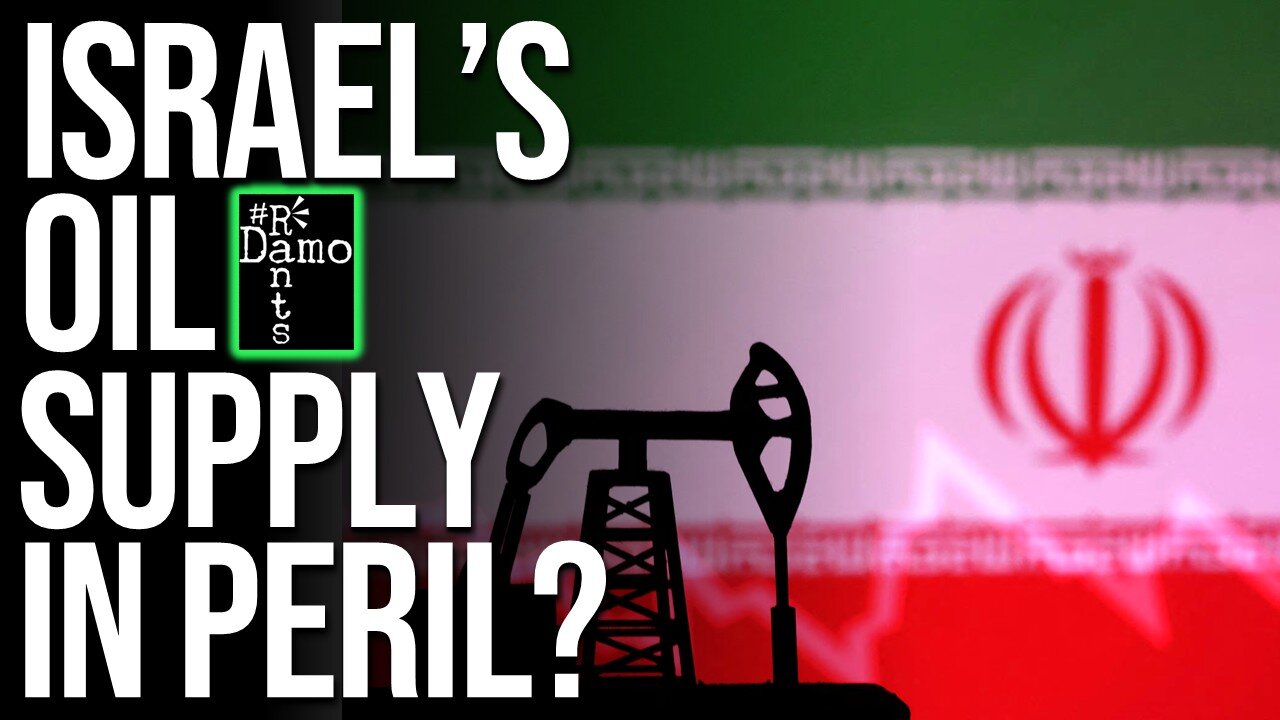Premium Only Content

Israel Cheers its Oil Lifeline — But Iran Plans to Snap it in Two
Right, so Donald Trump calls it the “Trump Route for International Peace and Prosperity,” which is a bit like naming a pickpocket’s alley “Charity Street” but the orange oafs ego being as massive as it is, he had to have his name in there somewhere. Behind all the backslapping and the handshakes at the White House however lies a geopolitical corridor less about peace than about power — a 99-year leasehold slicing through Armenia, bypassing Iran entirely, and funnelling influence straight into the hands of Washington, Baku, Ankara, and of course Tel Aviv. For Azerbaijan, it’s the liberation of its long-isolated Nakhchivan exclave from dependence on Iranian transit. For Turkey, it’s a physical link in its dream of a pan-Turkic superhighway stretching to Central Asia. For Israel, it’s a secure artery for the oil it already buys from Baku, which Turkey also supplies passage for, it could even increase supply via an alternative route. And for Trump, it’s a photo-op trophy to wave at voters — the kind that says “I fixed the Caucasus aren’t I wonderful” without ever explaining how the fix actually works.
It’s a victory lap for everyone except the one neighbour with the geographic muscle and political will to strangle this idea in its infancy. Tehran sees TRIPP, as its been abbreviated to, a prescient name perhaps if it falls flat on its face, not as a peace project, but as a US forward operating base in disguise — a direct challenge to its northern frontier and an unsubtle attempt to cut it out of regional trade and influence. And unlike Trump, Iran doesn’t do vanity projects. It plays the long game, and in the Caucasus, the long game has a habit of turning grand openings into expensive dead ends.
Right, so on 8 August, Donald Trump presided over a ceremony at the White House that he clearly intended to be remembered as a legacy-defining moment, he’s stuck his name on it after all. Between the flags, the smiles, and the careful staging, the US president-turned-mediating statesman announced what has been called a “historic peace accord” between Armenia and Azerbaijan, two neighbours whose shared history since the collapse of the Soviet Union has been marked by bitter wars, entrenched enmity, and unresolved territorial disputes. The centrepiece of this accord was the creation of the Trump Route for International Peace and Prosperity — instantly branded TRIPP — a transport corridor running through Armenia’s Syunik province to connect mainland Azerbaijan with its landlocked Nakhchivan exclave, this corridor just happening to be running right along Iran’s northern border. In a flourish characteristic of Trump, the deal came with a 99-year lease giving the United States development rights over the corridor, to be managed by a US-backed consortium. The US has the lease, Azerbaijan can reach their exclave, Armenia, had no leverage to argue the toss about it frankly.
Since 2020, Armenia has lost all of its Nagorno-Karabakh region and much of its defensive credibility, Azerbaijan’s military is far stronger, backed by Turkey’s drones, Israeli tech, and massive oil wealth. Russia—historically Armenia’s main security guarantor—has been distracted and weakened by the war in Ukraine, and its peacekeepers have done little to protect Armenian interests and so all in all, Armenia faced the reality that it could not indefinitely block Azerbaijan’s push for a corridor without risking another war it could not win. With most of the economic gains of this corridor going to Israeli oil suppliers Azerbaijan and Turkey, Armenia have gained only nominally here.
The announcement was met with predictable applause from Washington’s allies in the region. For Azerbaijani President Ilham Aliyev, this was the culmination of decades of strategic ambition: to secure an overland route to Nakhchivan that avoided both hostile Armenian checkpoints and the circuitous dependence on Iran. For Turkey, whose “One Nation, Two States” bond with Azerbaijan has been a cornerstone of its Caucasus policy, the corridor offered a physical deepening of its connection to the Caspian and beyond into Central Asia. Israel, a significant partner in Baku’s defence and energy sectors, could view the project as an additional safeguard for its oil imports from Azerbaijan, already a cornerstone of its energy security. And for Trump himself, the optics were irresistible: a branded, tangible piece of “infrastructure diplomacy” in a region where the United States has rarely dominated headlines.
Yet as the applause faded, a different story began to take shape — one that was less about diplomatic triumph and more about strategic overreach. Nowhere was that story more visible than in Tehran. The Iranian government’s reaction was immediate, forceful, and unambiguous. Press TV carried the words of Ali Akbar Velayati, senior adviser to Supreme Leader Ayatollah Ali Khamenei, who described the TRIPP corridor as a “US-Israeli Plot” designed to undermine Iranian security while masquerading as a development project, they’ve been sayting as much about it for weeks. Velayati’s warning that Iran would “block the creation of this corridor, with or without Russia” as he has said since the signing was not rhetorical theatre either; it was the clearest sign yet that Tehran would treat the project as a hostile encroachment, and that it was prepared to act accordingly.
The Iranian Foreign Ministry echoed this line in its own statements, striking a careful balance: welcoming peace between Armenia and Azerbaijan in principle, which of course nobody can argue about, but rejecting any foreign interference near Iran’s borders, which seems difficult given this corridor basically sits right on it.
In Tehran’s eyes therefore, the corridor is not a neutral trade link. It is a strategic bypass that would cut Iran out of east–west trade routes, strip away the leverage it had long held as Azerbaijan’s transit lifeline to Nakhchivan, and plant a US aligned infrastructure asset directly against its northern frontier, adding to the US presence already scattered across the Gulf region.
Concerns over the corridor’s security arrangements deepened the Iranian suspicion. In The Cradle’s coverage of this story, they have claimed that the deal’s terms included the deployment of approximately 1,000 US private military contractors, with authority to use force to “preserve the integrity” of the corridor. While Washington and Yerevan have neither confirmed nor denied such a provision, Tehran regards the claim as credible, pointing to the US history of using armed contractors to secure strategic assets in politically sensitive environments — from Baghdad’s Green Zone to the oilfields of eastern Syria, to those horrendous aid hubs in Gaza right now. For Iranian planners, the distinction between “civilian” and “military” in such contexts is academic; the presence of foreign security forces, even under a corporate flag, is a material change in the threat landscape. The US will be right on their northern border.
To appreciate the full depth of Iran’s alarm, we need to consider what the TRIPP corridor achieves for Azerbaijan and, by extension, what it takes away from Tehran. Since the collapse of the USSR, Nakhchivan’s connection to the rest of Azerbaijan has been severed by Armenian territory. During the First Nagorno-Karabakh War in the late 1980s and early 1990s, the routes were cut completely, and Baku was forced to rely on air travel or on a southern transit route through Iranian territory. That reliance gave Iran a quiet but potent form of leverage. At moments of political tension, it could slow or complicate transit, reminding Baku that geography made Tehran an unavoidable partner.
The TRIPP deal removes that lever entirely. By granting the United States development and management rights, the arrangement ensures that Azerbaijan’s link to Nakhchivan is both internationally guaranteed and outside Iranian jurisdiction. As Politico’s coverage noted, Armenia retains nominal sovereignty, but the reality on the ground will be dictated by US-backed management. For Aliyev, this is a strategic liberation from a dependence he has long sought to shed. For Ankara, it is a tangible advance toward its vision of a pan-Turkic transport spine stretching from the Mediterranean to Central Asia. And for Israel, it reduces the theoretical vulnerability of its energy imports to any disruption in Iranian territory.
For Iran, each of these outcomes represents a setback. The loss of Nakhchivan transit leverage means Baku no longer has a built-in reason to accommodate Iranian sensitivities, whether on border security, Caspian maritime boundaries, or relations with Israel. The strengthening of the Ankara–Baku axis presents a reinforced geopolitical bloc on Iran’s northwestern flank, one that is aligned with NATO and therefore adversarial to Iranian interests. The diversion of freight and investment away from the International North–South Transport Corridor — Iran’s flagship link with Russia and India — undercuts Tehran’s hopes of becoming a central node in Eurasian trade.
Armenia’s acceptance of the deal, meanwhile, has its own logic. Prime Minister Nikol Pashinyan had few viable alternatives. Armenia’s military, battered by those losses in 2020 and the swift Azerbaijani offensive in 2023, could not hope to block Baku’s demands without courting further disaster. Russia, its treaty ally, was distracted by its war in Ukraine and unwilling to commit significant resources to defending Yerevan’s bargaining position. Faced with the choice between an Azerbaijani-controlled corridor and a US-managed one, Pashinyan opted for the latter, calculating that a Western security presence — however limited — was preferable to the symbolism of Azerbaijani troops on Armenian soil. This was, by any measure, the least bad option available to him. Yet domestically, the decision has still been incendiary. Iran International has reported on the growing chorus of opposition figures and diaspora voices framing the corridor as a “great betrayal,” a narrative that Tehran can amplify to deepen political fault lines in Yerevan.
Iran’s hostility to TRIPP is rooted in more than just lost influence. Strategically, Tehran sees the corridor as closing a dangerous arc. To the south, US military assets are embedded across the Gulf states and in Iraq. To the west, Turkey stands as a NATO power with close operational ties to Azerbaijan and, indirectly, to Israel. Now, to the north, a US.-leased route — potentially guarded by armed contractors — runs along the frontier of Iranian Azerbaijan. This, Iranian officials argue, is not a coincidence but a continuation of a containment strategy. The result is a “continuous arc of pressure” that forces Iran to prepare for simultaneous threats from multiple directions. The northern border, once a relatively quiet flank, could become a corridor not just for freight but for surveillance and staging.
The implications extend to Iran’s civilian nuclear and medical research programmes. Past sabotage operations, from the Stuxnet malware that damaged Natanz to the targeted killing of scientist Mohsen Fakhrizadeh, and all of the nuclear scientists since back in June, have demonstrated the vulnerability of these sites to foreign infiltration. With TRIPP operational, research facilities in the north, such as the Bonab Research Center, face greater exposure to short-range drone surveillance or cross-border human intelligence operations.
Tehran might have expected to find in Moscow a willing partner in opposing the corridor. After all, the TRIPP deal sidelines Russia’s traditional role as the principal mediator in the Armenia–Azerbaijan conflict, and it inserts a US footprint into what Moscow has long considered its sphere of influence. Yet The Kremlin welcomed the peace accord, warned against foreign meddling, but stopped well short of promising to block the project. This divergence reflects the different stakes each country perceives. For Iran, TRIPP is an immediate security crisis. For Russia, it is a diplomatic setback but not an existential threat. Moscow’s primary concern is to keep Armenia from drifting fully into the Western camp, and that means avoiding direct confrontation over a US-backed initiative that Yerevan itself has accepted. Russia’s relationship with Azerbaijan, especially in managing Caspian energy routes, also acts as a brake on any impulse to obstruct.
Where Moscow hesitates, Tehran is more prepared to act. Crucially, Iran does not need to destroy TRIPP outright to succeed either. Iran very much still has options here. In infrastructure, perception is as important as physical capacity. A corridor plagued by delays, unpredictable disruptions, or inflated insurance costs quickly loses its appeal to shippers and investors. Here, Iran’s geographic position and regional networks work in its favour. Political influence within Armenia can be cultivated by supporting groups and narratives that challenge the corridor’s legitimacy, especially as domestic anger grows regardless of the US oversight. Economic incentives, such as offering discounted rates on Iran’s own transit routes, can draw freight away from TRIPP. Cyber and electronic warfare can be used to intermittently disrupt scheduling, signalling, or navigation, without leaving fingerprints that invite retaliation. Low-level sabotage of non-critical infrastructure — a damaged pylon, a vandalised signal relay — can increase maintenance costs and heighten perceptions of risk. Border friction, through increased inspections or customs delays on goods entering Armenia from the south, can quietly complicate supply chains connected to the corridor.
These tactics are neither speculative nor unprecedented. The history of the South Caucasus is replete with examples of formally guaranteed access routes becoming chokepoints in times of political tension. The Lachin Corridor, which connected Armenia to Nagorno-Karabakh under the terms of the 2020 ceasefire, was subject to blockades and restrictions that created humanitarian crises despite explicit agreements. Pipelines traversing the region have been sabotaged by insurgent groups. Rail links have been severed by disputes over tariffs or border demarcation. As Modern Diplomacy noted in its August 5 analysis, the economic potential of the Zangezur route depends entirely on the perception of reliability. And in this domain, Iran has both the capability and the motivation to shift that perception.
If TRIPP falters, the consequences will be unevenly felt. For Azerbaijan, it would mean a reputational blow that undermines Baku’s positioning as a dependable transit hub. For Trump, it would puncture the narrative of having brokered a lasting peace in a notoriously volatile region. For Israel, it could mean renewed vulnerability in the security of its energy imports, could this escalate to the point their oil supply pipeline gets affected even? For Iran, by contrast, it would be a vindication — proof that it remains an indispensable player whose exclusion guarantees instability.
Iran’s approach to such contests is inherently long-term. In the Gulf, it has used calibrated maritime harassment to alter the calculations of militarily stronger adversaries, geography very much being on its side. In Syria and Iraq, it has sustained campaigns over years, imposing costs without crossing thresholds that invite total war. TRIPP fits neatly into this playbook therefore. Tehran need not claim responsibility for every mishap; indeed, deniability is all part of the strategy. But each unexplained outage, each delay, each insurance premium increase can be framed domestically as evidence that the corridor is neither secure nor legitimate. And if US spy attempts or even attacks come from that direction, well then all bets would be off wouldn’t they? Internationally, it reinforces the argument that no infrastructure project in the region can succeed without Iran’s buy-in.
In the end, the TRIPP corridor embodies the paradox of infrastructure in contested geopolitical spaces. On paper, it is a multi-layered win for its backers: a strategic liberation for Azerbaijan, a pan-Turkic artery for Turkey, an energy safeguard for Israel, and a photo-ready legacy project for big orange man baby. Yet in its design, it has excluded the one regional power with both the will and the means to make it fail. Geography cannot be bypassed by ceremony, and in the South Caucasus, no corridor is truly secure unless all the neighbours agree to keep it that way. By cutting Iran out, the architects of TRIPP may have built not a road to prosperity, but a monument to the limits of imposed peace. They’ve just plain asked for trouble and on Iran’s doorstep at that.
Whilst all of this has been going on however, Israel has been quietly cornering Israel again. Netanyahu’s plan to go in and seize control of Gaza City has met with a rather under reported, but nonetheless significant move by Iran on the matter, so get all the details of that story in this video recommendation here as your suggested next watch.
Please do also hit like, share and subscribe if you haven’t done so already so as to ensure you don’t miss out on all new daily content as well as spreading the word and helping to support the channel at the same time which is very much appreciated, holding power to account for ordinary working class people and I will hopefully catch you on the next vid. Cheers folks.
-
 2:54:14
2:54:14
Barry Cunningham
5 hours agoBREAKING NEWS: PRESIDENT TRUMP SAYS HE MAY INVOKE THE INSURRECTION ACT! AND NOW WE KNOW WHY!
25.6K14 -
 40:13
40:13
Clownfish TV
11 hours agoMagic the Gathering Champion BANNED from Tournament Over MAGA Hat?! | Clownfish TV
9.36K19 -
 2:49:47
2:49:47
TimcastIRL
4 hours agoTrump Considers Invoking INSURRECTION ACT To Deploy National Guard to Portland | Timcast IRL
157K80 -
 10:05:38
10:05:38
Dr Disrespect
12 hours ago🔴LIVE - DR DISRESPECT - BLACK OPS 7 - GIVE ME BACK MY NUKE
130K16 -
 LIVE
LIVE
Drew Hernandez
2 hours agoTARGETED LEFTIST TERRORIST ATTACK IN CHICAGO & ISRAEL GEOFENCING U.S. MEGA CHURCHES
912 watching -
 8:58
8:58
Degenerate Jay
13 hours agoXbox Game Pass Is Getting Ridiculous
9.48K -
 7:03
7:03
GBGunsRumble
1 day agoGBGuns Range Report 05OCT25
5.99K2 -
 1:32:30
1:32:30
Glenn Greenwald
9 hours agoWill the War in Gaza Finally End? Flotilla Activists Predictably Abused in Israel's Dungeons; Van Jones' Revealing Joke about "Dead Gazan Babies" | SYSTEM UPDATE #527
90K66 -
 LIVE
LIVE
SpartakusLIVE
5 hours ago#1 King of Content brings MOTIVATION to the MASSES on Monday
489 watching -
 1:48:32
1:48:32
megimu32
4 hours agoON THE SUBJECT: 2000s Hits That Vanished! 🎶
6.91K3
